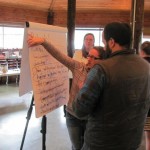
In 2010 Eugene finalized a Community Climate and Energy Action Plan (CEAP) that makes recommendations to reduce fossil fuel use and adapt to climate change. While the plan contains recommendations to adapt to climate change and rising fuel prices, the planning process did not have resources to adequately understand the adaptive capacity of community systems and services and prioritize adaptation actions. The process outlined below would continue where the Climate and Energy Plan left off – by carefully assessing the community vulnerability to these pressures.
Like communities around the world, the Eugene-Springfield metro area in the upper Willamette river basin has a unique set of vulnerabilities both to natural hazards and economic stresses. Local businesses, residents, and governments have tools to lessen the risk and respond to these vulnerabilities including building codes, emergency management plans, natural hazard mitigation plans, as well as municipal budget forecasting and savings and investments, among others.
Projected regional changes in climate due to global climate change and rising fuel prices brought about by a peak in global petroleum production will heavily influence the community’s vulnerabilities to natural hazards and economic stressors. For example hotter, drier summers are likely to increase the risk of wildfire within the wildland urban interface and within the region, increasing the likelihood of fire damage and poor air quality due to smoke.
The purpose of the vulnerability assessment is to use a comprehensive approach to determine the local systems and services most vulnerable to changes in climate, increasing energy prices and natural hazards. This information will be used to aid in prioritizing funding to increase local resilience and adaptive capacity.
This project starts with a pilot project that will develop and test a methodology in one or two of the systems/service areas. CSC staff will work with City of Eugene staff to identify the systems/service areas that will be analyzed in the pilot as well as the specific elements of the methodology. Initially, this project will focus on drinking water and storm water. Other systems or services will be added as the budget allows. More about Partnership for Disaster Resilience (OPDR)…








